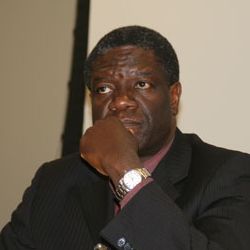Dr. Denis Mukwege, a gynaecologist, was trained in France, and could be working anywhere in the world. But he has chosen to work in the eastern DR Congo, where he founded and runs the Panzi Hospital. This hospital focuses on addressing the often-extreme needs of survivors of sexual violence – whose reproductive and sexual organs often need complete reconstruction after the unbelievable forms of sexual violence women suffer as a result of the ongoing armed conflict in the eastern DR Congo. The girls and women stream in on a daily basis. The scale of the crisis overwhelms the imagination.
Women´s organisations throughout the eastern DR Congo do what they can to get women to places like Panzi, where they can get the medical and psychosocial attention they need. They document their stories. They try to speak out. They call for a ceasefire of hostilities. They call for security for women from all armed groups – but the government in Kinshasa is far from being able to respond. And, tellingly, despite the fact that, as Dr. Mukwege says, the war in the DR Congo is being fought primarily on women´s bodies, they are (incredibly) not represented at all in the ongoing talks in Nairobi led by former Nigerian president Olusegun Obasanjo. They need to be there to ensure that issues regarding the security for women, and justice for all survivors of sexual violence are prioritised in the agenda.
It is for all of these reasons that Dr. Mukwege was just given the first African of the Year Award – an initiative of the Media Trust in Nigeria, administered by a pan-African advisory group led by Salim Ahmed Salim, former head of the Organisation of African Unity.
The African of the year award is intended to go, not just to an individual who has demonstrated compelling or outstanding personal qualities, but to an individual who has chosen to put those qualities to use, in service of an issue of critical concern for the continent.
Sexual violence in the context of armed conflict is one of those issues of critical concern – as Kenyan women know only too well now from our experiences in the past year. And the conflict in eastern DR Congo is equally an issue of critical concern.
The DR Congo’s mineral resources are its blessing and its curse. Not enough attention is paid to the role of the DR Congo´s mineral resources in ensuring the continuation of hostilities – as eventually happened with the “blood diamonds” of Liberia and Sierra Leone.
As we praise the efforts of the many Congolese like Dr. Mukwege, who have tried to find needed and practical responses to the crisis, we must insist that the mediation process step beyond the already contested bounds prescribed by the two protagonists in the process. There is so much more at stake for Congolese civilians, particularly women. And it is only with their voices being actually heard and responded to that this seemingly incessant conflict will end.





